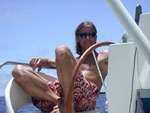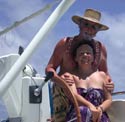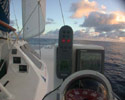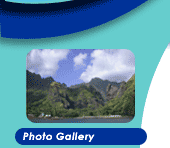This section encompasses a collection of stories and
passage notes written while underway during the first leg of Voyage
Two of Pacific Bliss, the 3252 nautical mile passage from San
Diego, California to Atuona Harbor in the island of Hiva Oa, Marquesas,
French Polynesia.
_____________________________________________________________
April 7, 2002
3º29'N, 131º 20' W
Sailing 6-7 knots in a 20-Knot NNE Wind
Ray Goes Blind!
I woke up to the strains of Beethoven and the welcoming aroma of a
Starbucks French Roast coffee freshly made by Gunter, who now has the
0600-0900 gravy watch. The 0830 Puddle Jump SSB Net was just beginning.
Some of the cruisers who crossed the line earlier are experiencing SE
trades; others are still in the doldrums, lolling about with no wind
and begging those who have yet to cross the line to please beseech Neptune
for some wind when they do cross. "Give him a little extra champagne
on our behalf," they pleaded.
I wondered whether they had done as Gunter had suggested we do: "Can't
we just drink all the champagne ourselves, then refill the bottle with
salt water, and dump it all into the ocean for Neptune?" he had
the nerve to say.
"Absolutely No!" I had protested. I had been reading one
too many sea books, and had picked up on some of the numerous superstitions
of sailors. "It is like the christening of Pacific Bliss
in France, but then we broke the entire bottle of champagne over her
bow," I added. "This time, we need to just put a little into
the sea."
Now I wondered whether these Puddle Jump cruisers had cheated Neptune
and were now asking us to intervene in their behalf. NOT.
It was during the Vin Rouge Net-our twice-daily communication with
Makoko-I remember it well, when Ray got sick for the second time
this week. At first, we could not make the diagnosis-and that's with
three doctors on board (two MDs and one physicist). We were transmitting
on the SSB when the autopilot failed. We quickly broke off the connection.
"Ray's going crazy," Gunter said. The four of us gathered
around the nav station as the COG (course over ground) in the PILOT
menu of the Raytheon multiplex wandered off our set course of 202º
to 156º to 192º, back to 202º, holding for a short while,
then going bonkers again.
"Armin, steer manually to our course," Gunter instructed.
"OK" he answered, concern written over his normally inscrutable
face.
"Not Ray, he can't die," I gulped. "We depend on him
like a crew member. He is our fifth crew."
"Maybe he hasn't had enough nourishment," said Doug, the
retired baby-doctor.
"What do you mean? We give him all the juice he wants. Why, I
even turned the freezer into a second fridge to save amps for Ray,"
Gunter reasoned, defensively. "Let's shut off all the instruments,
like we did when we reset the trip log and Ray acted up."
Gunter proceeded to turn off the instruments while Armin steered. Then
he said, "Armin, lay off and I'll press AUTO again."
"He's in!" The knot forming in my stomach relaxed a little.
In spite of their attempt at humor, I knew that everyone was feeling
the same way inside.
"Oops, he's not holding," Armin called out from the helm.
Wild and erratic readings were coming out of Ray.
"We have to be prepared for Ray to go," Doug mouthed to me.
I sensed that we were all having the same "daymare," called
HAND STEERING. I envisioned grueling two-hour watches instead of three,
then I wondered whether we could even handle that, with a wind speed
of 20 knots on the quarter. Ray had been working very hard. Or, would
we be rotating every hour, rising from our bunks like robots, tapping
the shoulder of the exhausted helmsman, slumped stoically over the wheel,
"It's my turn now." For close to 1000 miles we would continue
on, changing the trip from a joy to a pain. Forget the saying on one
of my cruising T-shirts: "Attitude is the difference between ordeal
and adventure." It's not attitude; it's Ray. We should have appreciated
him more.
"I don't think it is Ray himself that is giving out," Gunter
watches the erratic readings pouring forth. "I'd hate to think
that it is his computer…I mean, his brain. But we should pull out
the Raytheon backup kit we bought in San Diego." Gunter and Doug
carefully unpacked the kit that we had safely stored under the settee
in the salon. They laid out the spare body parts for bionic Ray as if
the salon table was part of a surgical suite.
"This is the new, improved version of the Raytheon computer,"
Gunter began, pointing to the part.
The lump in my stomach came back big time. My mind turned to all the
new versions of computer hardware and software that had paraded through
my life, and I recalled that no repair was easy or quick. I was reminded
of the horrors of my Sony VAIO laptop crashing in Acapulco under the
abuse and humidity of Voyage One. At that time, it had been our only
computer on board. Now we have two laptops. And, thank God, we have
had the foresight to purchase spare parts for Ray.
Doug picks up the computer. "As a first stage to potential installation,
let's see if the new one even fits." Gunter and I unpack the storage
underneath the nav station, handing out tools and more tools-sets of
wrenches, hammers, you name it-surgical instruments that we would perhaps
need for Ray, clearing a path to Ray's brain, mounted way the back.
"Hand me the box," says Gunter, deep into the innards. "No,
It's is not even the same size, it won't fit in here," Gunter says,
coming up for air.
"Do we even know that the computer is the problem?" I ask.
"No," says Gunter. "In fact, it appears that the erratic
input is coming into Ray from someplace else, and he just doesn't know
how to process it."
"His eyes!" says Doug. "He can't see. He's blinded.
That's why Ray is just groping around."
"This kit has a compass. Perhaps that is it," Gunter says,
pondering.
"We do have the Iridium Sat phone this trip," I add. "Why
not ask David for his advice before we go further? He would probably
know whether Catana has had problems with the compass before.
"He seems to be quite clever," says Doug.
"Yes, let's call him," says Gunter, picking up the phone.
Fortunately, he connected right away, and David was there in the office
at Yachtfinders. David said that happened on the 471; the autopilot
was out for 6 hours, then came back.
"Try leaving it off longer, like 20 minutes or so," David
suggested. Also, then you can try resetting it with the circle approach
outlined in the manual."
We tried both, hand steering for 20 minutes, then punching AUTO, and
took down the sails, motored, circling. No luck on resetting. We kept
on through lunch time; obviously no one was hungry. Gunter called David
again. He suggested installing the new flux-gate compass by fastening
it temporarily to a table-or any convenient surface, then disconnecting
the installed one, which was conveniently located on the wall under
the slats of the bed in the owner's hull. You can guess what that involves!
With that disconnected, we install the new compass temporarily with
a cable to the cockpit table; we want to make sure that it is absolutely
away from everything. Doug and Gunter drive Pacific Bliss through
the circle route again. The compass takes the settings!
All this registers onto Ray's brain, with his new bionic eyes temporarily
and crudely installed, he springs back to life. He can see! He begins
to steer Pacific Bliss again like the trooper we all know he
is. We breathe a collective sigh of relief. Ray is back. Yea! Ray!
The diagnosis and temporary surgery had taken over four hours. We were
all very hungry now, but we couldn't leave the tangle of life support
cords connected to Ray coming from every direction. We owed it to Ray
to complete the job and tidy up the surgical suite. So we found a home
for Ray's eyes in the teak binocular holder, and duct-taped them in.
Then we duct-taped the nerves to make a passage around cabinets, across
the salon floor, all the way into Ray's brain. Ray would need to undergo
some serious rehabilitative surgery at some calm anchorage in the Marquesas.
But for now, he could go back to work.
I had been making a batch of potato salad in between hand steering
a little, stringing cords, and worrying, so lunch was ready when the
clean-up was completed. Sitting at the cockpit table, under sail again
and back on course, the droning of the diesel silenced, the four of
us stared at the empty helm seat. Pacific Bliss was gliding along
at 6.5 knots and Ray was back in control. The adrenalin surge abated,
the cold salad turned out to be one of the most satisfying meals we'd
had.
Our thoughts turned to Ray. "I think that the SSB is the culprit,"
Gunter began the conversation.
"You know, sometimes when we are transmitting, the lights in the
owner's hull flicker," Doug added.
"And when we transmit sometimes you can hear the engine dragging,
when its running, like when we've sent out Sail Mail at the same time
we've been charging the batteries," I chimed in.
"Any time, I'll give up my Sail Mail for Ray," Doug, Armin
and I started to say versions of the same promise.
"I think we just need to turn down the intensity," said Gunter.
"But as a precaution, let's not transmit Sail Mail until we're
closer to the Marquesas."
Photos: click on the thumbnail to see a larger version..
 :
Doug Relaxes with Ray Back in Control. :
Doug Relaxes with Ray Back in Control.
Gunter and Lois Relax at the Helm
 Ray
Works into the Sunset Ray
Works into the Sunset
_____________________________________________________________
|














